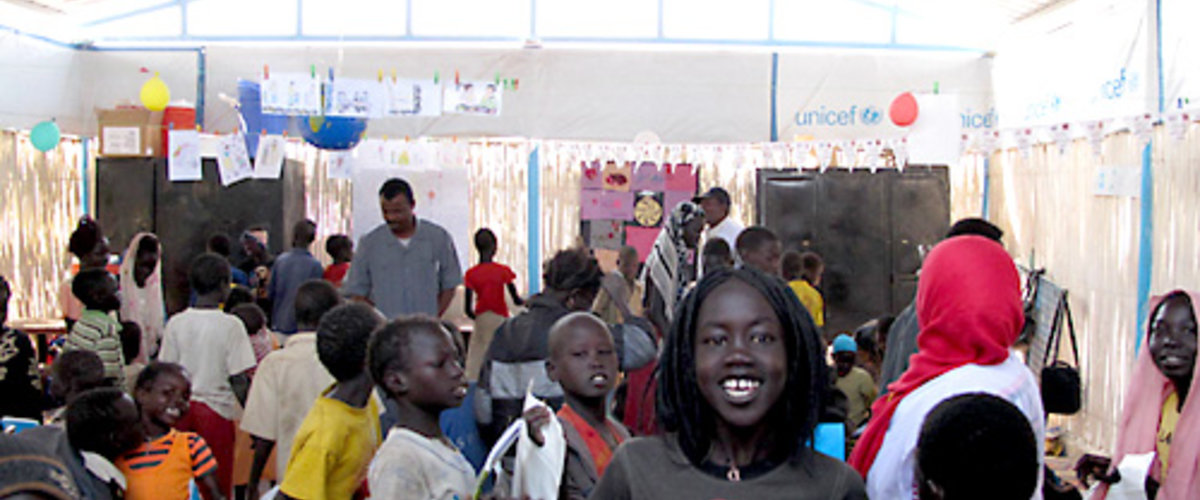In prolonged transit
In his late fifties and a tailor by profession, Mr. Noa arrived at the Kosti way station in early January from Khartoum, where he had lived for 31 years.
"I was staying in Khartoum because of the war," he said, adding that he was waiting for the barge to take him and his family of seven to Juba, his place of origin. "But now I am free to go back."
Mr. Noa was one of some 2,900 returnees idling at the way station in Kosti, White Nile State, in mid-January (by 2 February, the number had climbed to over 4,100). Due to its central location on the River Nile, the town has been a main hub in Sudan for formerly displaced persons returning from northern to southern Sudan.
From the signing of the country's 2005 north-south peace agreement until last October, over 2.27 million people had passed through Kosti via organized and spontaneous returns, according to tracking figures by the International Organization for Migration and Adventist Development and Relief Agency.
But just before registration for Southern Sudan's referendum began last November, numbers of returnees passing through the gateway skyrocketed. In a mere three months, some 170,000 transited through Kosti, amounting to almost 7.5 per cent of the total returnee figure to date.
A journey suspended
Many returnees have had to stay at the way station for weeks, waiting to move on by barge or bus. Some set up shop selling items in demand, including pre-paid telephone cards, canned beans and pasta, soap or sweets.
Twenty-four-year-old James Nikol, who spent two years in Khartoum's underprivileged Soba area with his mother, was aiming to get to Juba, Central Equatoria State. While in Kosti for a week, he was among those charging mobile phones for a small fee with a generator.
Thanks to child-friendly spaces operated by local and international non-governmental organizations (NGOs), children kept active. They were learning about health and hygiene through songs and role play, and about the perils of unexploded ordnance.
Mine-awareness education was potentially lifesaving knowledge for their return to remote areas that may still be littered with mines from Sudan's civil war.
Thanks to a coordinated effort by various UN agencies, NGOs and Sudanese authorities, returnees at the way station had medical care, received 30-day food rations after registration, and had access to shelter, water and blankets. But their onward journey largely depended on the arrival of a barge that would take them and their belongings to various locations in Southern Sudan, including Renk, Malakal and Juba.
Those aiming to continue onwards by bus had been stalled by security problems along the way, as had a group that had arrived from Khartoum by train.
Due to insecurity in Southern Kordofan State -- on the way to the rail destinations of Aweil and Wau (Greater Bahr El-Ghazal) -- the train was stopped on 10 January. Some 400 returnees were forced to rely on 15-day food rations from the World Food Programme as well as water, blankets and other essential items handed out by various humanitarian actors.
The train, a meager home for returnees for several weeks, finally left Kosti on 27 January and arrived in Aweil six days later.
South to north
Recent security issues have affected communities living around Sudan's north-south borders as well, resulting in some 4,000 people moving north from Upper Nile to White Nile State.
Some moved to an open, dusty area off the Rabak-Malakal road as early as October 2010, due to harassment from Sudan People's Liberation Army soldiers in Joda Fokhar, a village straddling the two states. To preempt violent conflicts, the mainly farming community of the Nezi (Arab) tribe moved about 50 kilometres north near Hudeib village, where they originated from in the early 1950s.
"As people, we never had problems between the north and south," Sheikh Ismail Asakir said. "We often intermarry ... The problem is with the armed forces."
Along with another group settled further east in Jebelain locality, the number of returnees amounted to over 2,200 people. An additional 1,890 persons arrived from Kweik village bordering Upper Nile and While Nile states, west of River Nile.
They were lingering in remote areas of Al Salam locality about 90 kilometres south of Kosti – cut off from services, schools or medical care. According to an assessment mission by UN agencies and NGOs in late January 2010, these south-north returnees were in need of safe drinking water, shelter, latrines and a medical facility.
 UN
UN United Nations Peacekeeping
United Nations Peacekeeping





